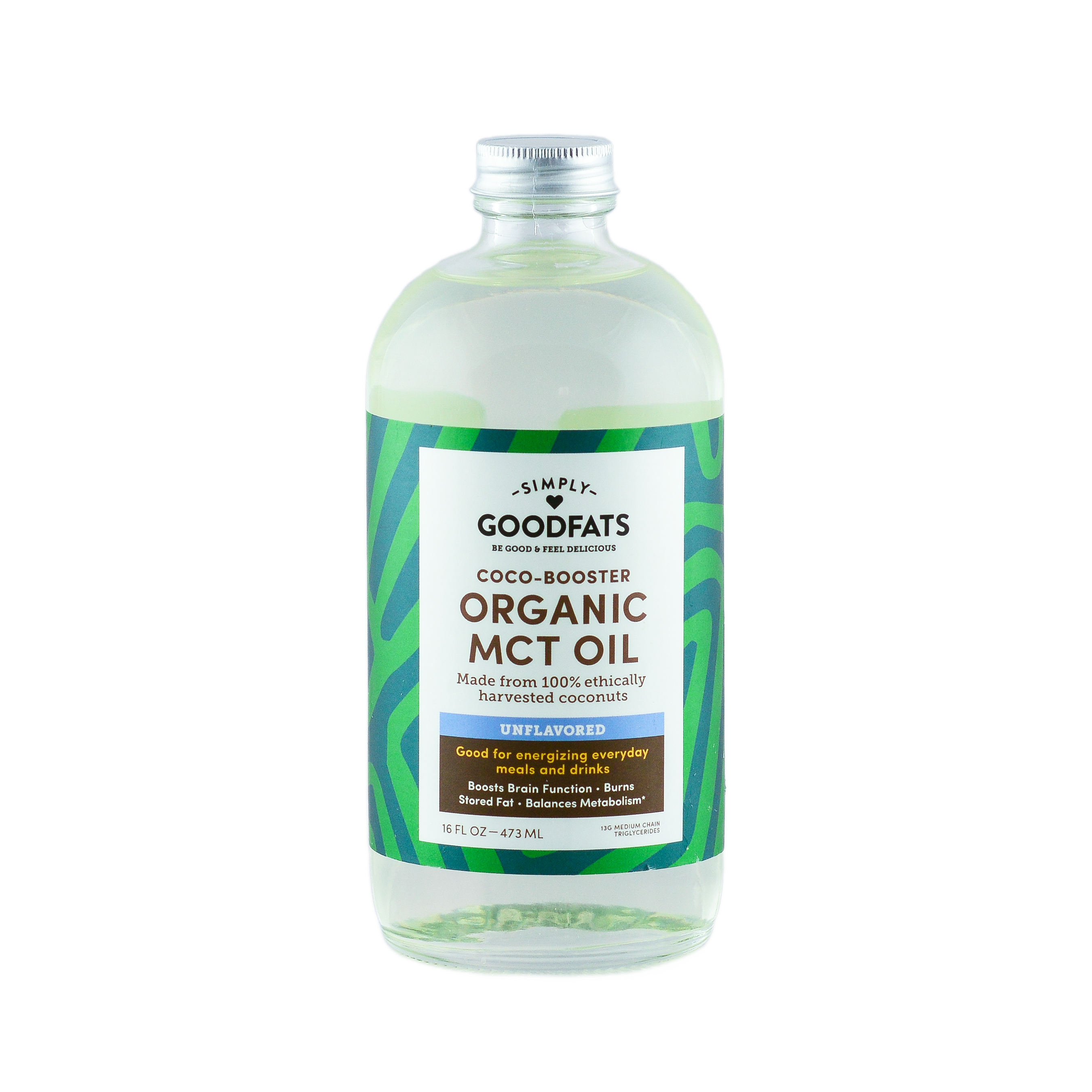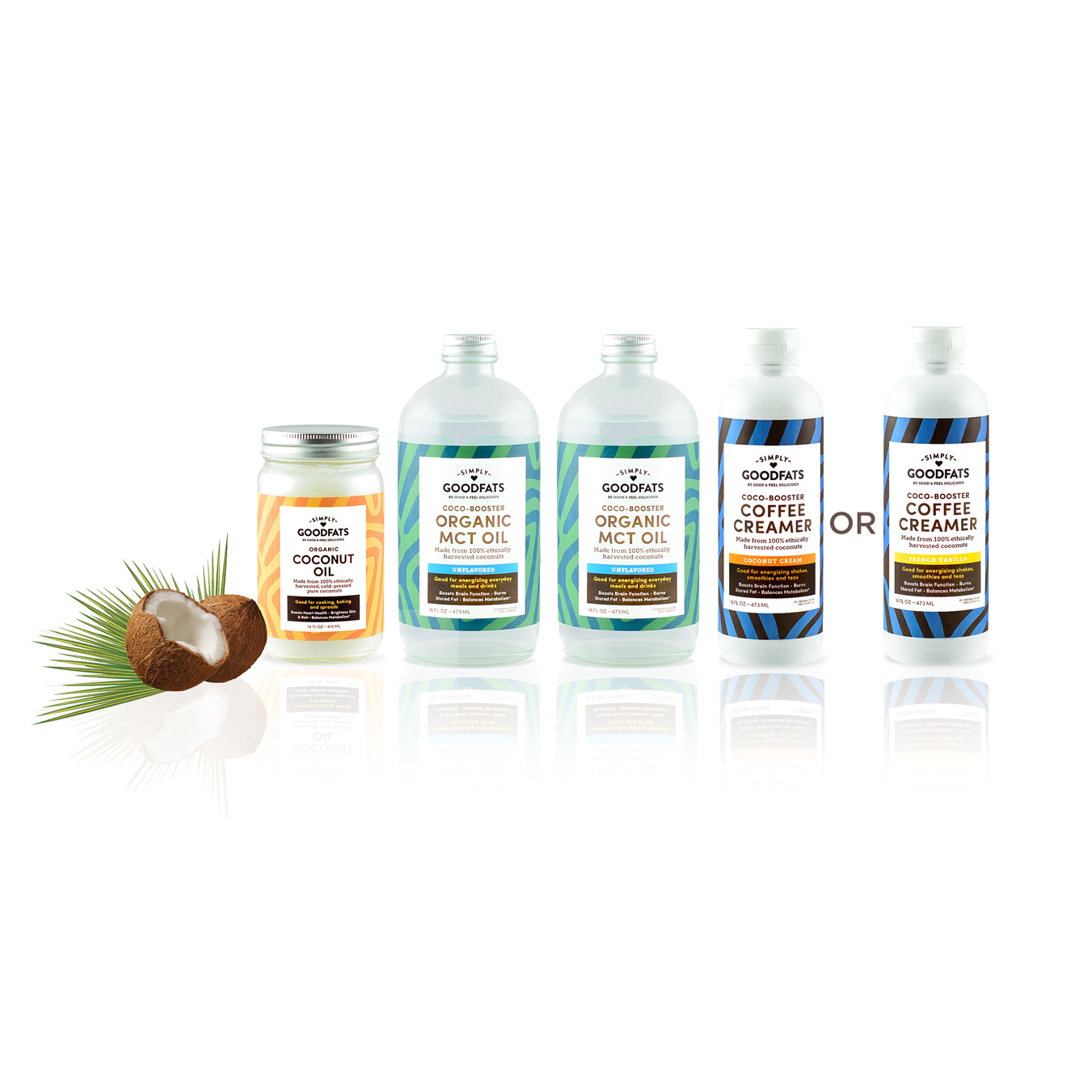Sugar Made You Fat, Not Fat
September 14, 2018
Posted by Simply GOODFATS
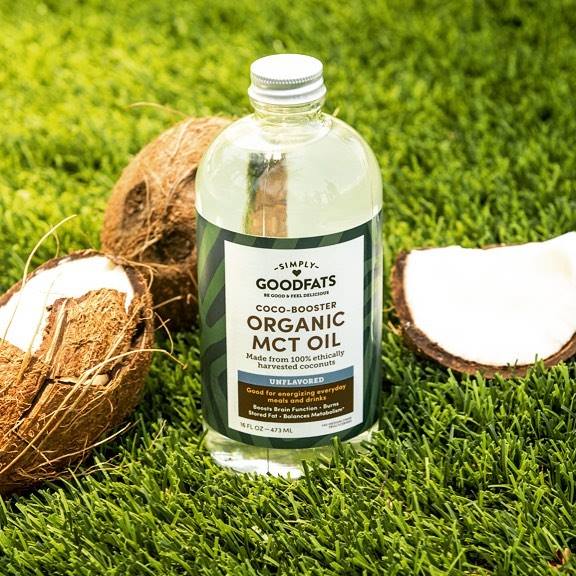
Low-fat, no-fat, reduced fat, etc. etc. etc. These are the words we see plastered over literally thousands upon thousands of pre-packaged (so-called) ‘health foods’ that are on store shelves. The name of the game, according to the outdated model of thinking, is that fat makes you fat and calories are calories.
While this method of thinking makes everything appear simple and easy, the truth is that the simplicity is just a trap that plummets those following the guidelines into a blind race against their own body. All calories are not the same within the body and one calorie in particular, sugar, is the most deceitful of all.
Let’s explore not only why sugar is making us fat but also how the correct types of fats such as Omega and MCT oils are actually beneficial to the body and can assist the body in reducing fat and improving body composition within the body.
The Sugar Trap:
There are three things which tend to cause the brain to like a food: sugar, fat, and salt. Companies will mess with these three variables to try and find what the company calls ‘the bliss point.’ When you remove or highly reduce fat there tends to become an issue… packaged products taste worse. To compensate for that a company will tend to increase the sugar or salt content of the product in order to make them tastier. To many in the food industry taste is king. As Stephen Sanger, CEO of General Mills, reportedly said in a meeting (linked above):
“Don’t talk to me about nutrition, talk to me about taste, and if this stuff tastes better, don’t run around trying to sell stuff that doesn’t taste good.”
The priorities of some of the major food companies can be seen in that statement. Their primary concern is increasing profits for their shareholders. While health and profit have aligned more since that infamous statement the truth is apparent, for most of the food industry, profit is king and the rest is just details.
So we’ve established now how the food industry thinks; however, how does this relate to sugar? Sugar is one of the key pillars in achieving what the industry calls the bliss point of a product. If you reduce fat, which is a key carrier of flavor, sugar tends to be leaned on as a ‘taste provider.’ The issue sugar has is due to how the body processes sugar:
Does sugar make you fat? Let’s say you consume a glass of orange juice that is a bit larger than one serving and delivers 10g of sugar as 5g glucose and 5g fructose. The juice lacks most, if not all, of the fiber found in the orange. Half of the sugar, the fructose half, has no use within the body and is sent to the liver and treated as a poison and processed in a similar way to alcohol. The body releases insulin to help break down the sugar and allow it to pass into the liver. A majority of the sugar is converted into pyruvate within the liver and sent to the mitochondria to be burned off; however, since you’ve sent a large volume of pyruvate to the liver it cannot burn off all the pyruvate into energy through the TCA cycle. The left-over compound to be stored, as your body is now overwhelmed, is citrate. Citrate goes through the De Novo Lipogenesis (new fat making) and is stored as fat (VLDL) and primarily as visceral fat. Visceral fat is what causes a beer belly or a sugar belly on a person and is why weight is sometimes so disproportionally stored in the stomach region. Another issue that sugar mimics, similar to alcohol, is fatty liver disease. Sugar can, eventually, trigger a similar phenomenon called non-alcoholic fatty liver disease which is caused due to the amount of De Novo Lipogenesis that the liver is needing to do.
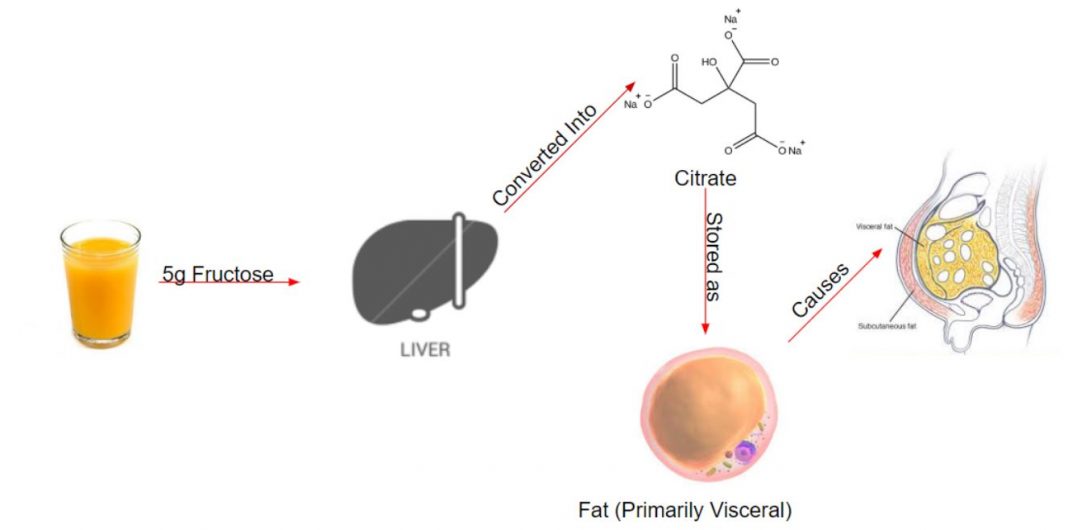
The Sugar Paradox: Calories but not satiety
So as companies began replacing fats with sugars within their foods to show a nutrition label that people believed was healthy, obesity began to pick-up greatly. If you look at the conversion cycle above, should that come as any surprise?
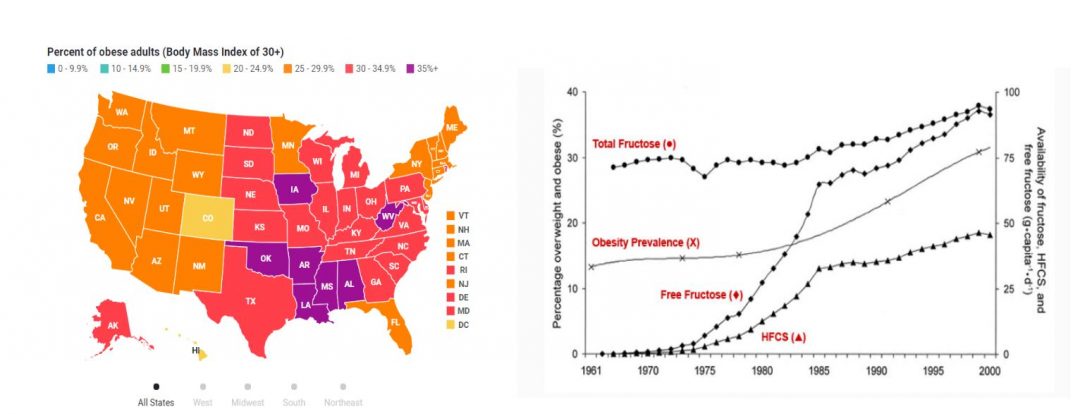
Image Source: State of Obesity in the US (left) and Living Fructose Free (right)
Sugar does increase caloric content but the body doesn’t fully register the calorie as food as there is no nutrition and no long-lasting energy supply. The combination causes energy spikes within the body. When your blood-sugar goes low, during the crash, the body sends signals to the brain to release the hormones to produce hunger. Since sugar becomes harder and harder for the body to use as a stable fuel source you go through energy ebbs and flows. The interplay between blood sugar spikes and the fact that sugar doesn’t have the same satiety benefits of a protein or fat and sugar stimulating the reward center of your brain all play into the weight gain. We’ve increased our overall consumption of sugar dramatically since the 1970s dietary guidelines were released and obesity has spiked despite consumption of less fat as a percentage of the diet.
In short, while the obesity epidemic might be due to higher caloric consumption, sugar is the culprit, not fat. Fat becoming the scapegoat for obesity was due, in no small part, to the cunning of the sugar industry as the New York Times revealed in 2016.
All fats are not equal:
Before rushing out to change your diet it is important to note that not all fats are equal. There are horrible fats for your body such as trans fats. There are fats which are fine in moderation, such as long-chain triglycerides from animal sources. Then there are the true powerhouse healthy fats: omega and medium-chain triglycerides.
Omega fats:
Omega-3 fats are primarily found in fish, chia seeds, walnuts, and grass-fed beef and dairy products. Omega-3 is beneficial to the body by providing the body with nutrients which assist with brain, heart, and metabolic benefits. Omega-3 is also an essential nutrient as our bodies cannot create Omega-3 within the body so the only source of acquiring it is through consuming products containing Omega-3 fats.
Omega-6 fats are primarily found in nut and vegetable oils, nuts, and seeds. Omega-6 is beneficial to the body by providing the body with nutrients which assist with energy and immune response. It is important to note though that the ratio of Omega 6 to Omega 3 is currently believed to be best at a ratio of 10:1 or less. The current western diet though tends to strike the ratio at 50:1 or worse. So when purchasing products it is recommended that you focus on eating enough Omega-3 fatty acids first and foremost as Omega-6 tends to be much easier to consume. Omega-6 is also an essential nutrient that your body cannot produce.
Omega-9 is a non-essential nutrient found primarily in nuts and olive oil. While Omega-9 is not an essential nutrient to the body as the body can produce it, intake of the fat is not detrimental to health. In fact, some studies show that consuming Omega-9 fat helps fight LDL cholesterol and helps improve insulin sensitivity among those with diabetes.
Medium Chain Triglycerides: MCT
MCT oils have been shown in various studies to promote a reduction in weight, improve blood sugar management, and body composition.
The reason why MCTs are unique in the fat family for their benefits is due to the unique process within the body that MCTs utilize. Two of the three components that create MCTs are C8 and C10. These two compounds are quickly converted from fat to energy within the body as both can be processed by the liver and do not require the intestines for processing. The energy produced by C8 and C10 are ketones and these ketones are a more efficient and longer lasting fuel source for the body than glucose. Since the ketone bodies present a longer lasting energy source they’ve been shown in studies to both increase satiety between meals and reduce the consumption of food at the following meal after taking a MCT oil.
The Bottom Line:
Reduce your sugar consumption ASAP. The best way to do this is to read labels and avoid packaged foods in general.
Incorporating a fat-first diet and MCT oils can also be a hugely beneficial step to your weight management goals. As discussed above, MCT oils help with satiety, weight management, and promote the body to use fat as its fuel source. In addition the re-introduction of fat to the diet has helped many individuals, ranging from celebrities to people just like you, kick their sugar addiction by providing you with another way to achieve a delicious meal. I referenced the “bliss point” of food at the very beginning of this article and how it was used to pump more sugar into the food system. Use it to your advantage now to create healthy foods with good fats and see the benefits yourself.
Product(s) mentioned in this article
Other blogs
MCT oils are better than olive oil for weight management and weight loss
ShareShareTweetPin
How MCT Oils can help weight loss
ShareShareTweetPin
Unlocking MCT Oils to help regulate blood sugar
ShareShareTweetPin


